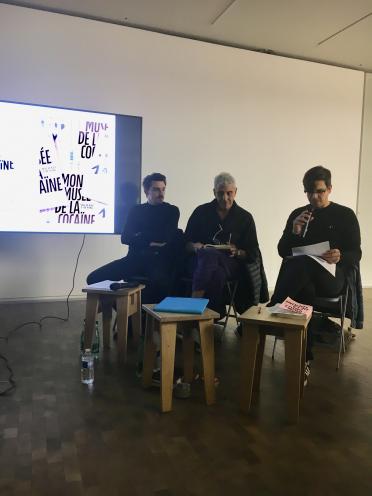My Cocaïne Museum
Friday 09 Nov 2018 from 6:30pm to 8pm
Free admission

Michael Taussig, "Mon musée de la cocaine"
Launch of the French translation of "My Cocaine Museum" by Michael Taussig, who will be in conversation with David Dupuis.
The premise for Michael Taussig's book is a make-believe Cocaine Museum, modelled on the Gold Museum in Colombia's central bank. In it, the author paints an uncompromising portrait of the lives of Afro-Colombian gold miners drawn into the dangerous world of cocaine production, deep in the rainforest of Colombia's Pacific Coast.
Gold and cocaine are the raw materials for "My Cocaine Museum". They also feed a mysterious system of transmutation: Taussig describes how global capitalism transforms the heat and mud of the Colombian coast into a desirable substance for Wall Street brokers. More importantly, he reveals how the transformation and refinement of gold and cocaine are rooted in a history of oppression and slavery: "Death stalks these substances in measure equal to the way they enliven life, enchant and compel."
Taussig's affirmation that gold and cocaine are "congealed miasma" points us to their production process. He describes the violence, poverty, as well as the beliefs, that permeate the mangrove swamps and tropical rivers which, for more than 500 years, have tempted and ruined Indians, gold-panners, conquistadors and pirates, African slaves, Russian engineers and Marxist guerrillas.
"My Cocaine Museum" is an eclectic compilation of history and storytelling. Its pages are the rooms inside this hypothetical Cocaine Museum which we, the reader-visitor, are invited to explore, taking in references that extend from Charles Dickens and Franz Kafka to the poetry of Seamus Heaney.
"Mon musée de la Cocaïne" is translated from American English by Julia Burtin Zorte and published by Les Editions B42 as part of its Culture collection, directed by Mathieu Kleyebe Abonnenc.
The evening is hosted by Mathieu Kleyebe Abonnenc.
Taussig's affirmation that gold and cocaine are "congealed miasma" points us to their production process. He describes the violence, poverty, as well as the beliefs, that permeate the mangrove swamps and tropical rivers which, for more than 500 years, have tempted and ruined Indians, gold-panners, conquistadors and pirates, African slaves, Russian engineers and Marxist guerrillas.
"My Cocaine Museum" is an eclectic compilation of history and storytelling. Its pages are the rooms inside this hypothetical Cocaine Museum which we, the reader-visitor, are invited to explore, taking in references that extend from Charles Dickens and Franz Kafka to the poetry of Seamus Heaney.
"Mon musée de la Cocaïne" is translated from American English by Julia Burtin Zorte and published by Les Editions B42 as part of its Culture collection, directed by Mathieu Kleyebe Abonnenc.
The evening is hosted by Mathieu Kleyebe Abonnenc.

Michael Taussig is an anthropologist known for his provocative ethnographic studies and unconventional style as an academic.
He was born in Australia and later studied medicine at the University of Sydney. He earned a PhD in anthropology at the London School of Economics. He is currently a professor of anthropology at Columbia University in New York and at The European Graduate School / EGS in Switzerland. In spite of his numerous publications in his field, especially in medical anthropology, he is most acclaimed for his commentaries on Karl Marx and Walter Benjamin, especially in relation to the idea of commodity fetishism.
David Dupuis holds a PhD in Ethnology - Social Anthropology under the supervision of Dr Philippe Descola. His doctoral research has been based on eighteen months of fieldwork in Takiwasi, a therapeutic community located in the Upper Peruvian Amazon. He is now a Visiting Fellow at the Department of Anthropology of the University of Durham, funded by the Fyssen Foundation.
His doctoral research has been based on eighteen months of fieldwork in Takiwasi, a therapeutic community located in the Upper Peruvian Amazon. The therapeutical team includes medical doctors, psychologists and traditional healers using some mestizo shamanism practices. The treatment is based on the ritual use of medicinal plants – including the hallucinogenic brew ayahuasca – psychotherapy and speech groups. The use of plants is done in a ritual context mixing elements of Amazonian shamanism, Catholicism and the New Age. His doctoral dissertation has been focused on ritual innovations, modes of transmission of religious knowledge and the topic of therapeutic effectiveness in Takiwasi.
He is now a Visiting Fellow at the Department of Anthropology of the University of Durham, funded by the Fyssen Foundation. In collaboration with Hearing the Voice team, He is working on the experience of auditory verbal hallucinations (AVH), occuring in amazonian shamanism contexts, especially during the ayahuasca rituals and retreat times in the jungle. He aims, in a second step, to advance this work in order to elaborate a cross cultural and comparative model of the arousal, socialization and control of AVH in various social contexts. His goal is to shed light on how cultural repertoires affect the nature and intensity of AVH, illustrating how culture affects our mental experiences. He is consequently planning to conduct further ethnographic fieldworks in order to collect new data with a view to better understand what he calls the socialization of AVH.

